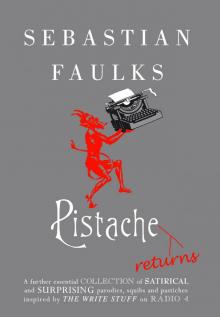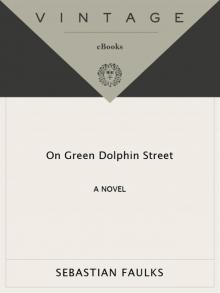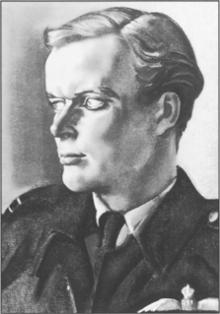- Home
- Sebastian Faulks
Birdsong Page 12
Birdsong Read online
Page 12
“There are things I remember about the place that will be with me even on the day I die. The smell of the soap that we used to clean the floors and the feel of the uniform against the skin. I remember the big room with a ceiling that was so high it was almost lost to view and the long tables we ate from. I’d been happy enough with my grandmother. I’d never seen so many people in one place before and it seemed to me each one of us was diminished by it. I had feelings of panic when we sat there, as though we were all being reduced to numbers, to ranks of nameless people who were not valued in the eyes of another individual.
“Those of us who had family or people to see were allowed out from time to time. I would spend the day with my grandparents. He was back from prison by now. One day I had a fight with a local boy, and I hurt him much more than I meant to. I can’t remember who started the fight or what it was about. It was probably my fault. I remember seeing him sink to the ground and wondering what I had done.
“His parents called the police and there was a fuss. I was sent back to the home because I was too young to stand trial. The incident was reported in the local paper and a man I had never heard of called Vaughan must have read about it. My grandmother was excited because this man was rich and said he wanted to help. He came to see me in the home and talked to me for a long time. He was convinced I was clever and needed to be given a chance to improve myself. He asked if I was willing to let him be appointed my guardian by the court. I’d have done anything to escape from the institution, and my grandparents were happy for someone else to take the responsibility.
“It took a year for all the legal things to be gone through. He was quite well known locally. He’d been a magistrate, but hadn’t married or had children himself. He insisted that I go to school during the day and he taught me himself in the evenings. I lived in his house and he somehow procured me a place in the grammar school.”
“What’s that?”
“A school where they teach you Latin and Greek and history. And how to use a knife and fork.”
“Didn’t you know how before?”
“Not with any finesse. But I learned all the lessons they gave me. It was difficult to begin with because I was so far behind. But the teacher was encouraging.”
“So he was your great benefactor, like the good genie in a story.”
“Yes. Except for one thing. I didn’t like him. I thought he would treat me like his son. But he didn’t. He just made me work. He was a social reformer of some kind, I suppose, like the priests who went into the slums of London to work with the boys there. I think his interest in my learning was a substitute for other things in life. He never showed me any affection, he just wanted to know how much progress I’d made with my studies.”
“But you must have felt grateful to him.”
“Yes, I felt grateful. I still do. I write to him from time to time. When I finished at the school he found me an interview for a job with a firm in London who paid for me to go to Paris on their behalf to learn the language and find out more about the textile industry. Then I worked in London, living in lodgings in a place called Holloway. Then I was dispatched to Amiens.”
He looked at her with relief. The self-revelation was over. “That’s it.”
Isabelle smiled at him. “That’s all? That’s all your life? You seem so old to me, I think of you sometimes as being older than I am. It’s your eyes, I think. Those big, sad eyes.” She stroked his face with the tips of her fingers.
When they returned to the hotel Isabelle went ahead to the bathroom. She noticed with dismay that, despite her elaborate carelessness, the blood had returned at its appointed time.
———
After a week in Plombières they traveled south. Stephen wrote to his company in London, enclosing his reports and explaining that he would not be returning. In Grenoble they celebrated his twenty-first birthday and he wrote to Vaughan thanking him for his guardianship, which was now ended. They stayed until some money arrived for Isabelle, wired from Rouen by Jeanne, whom she had contacted by letter. Stephen still had two large English bills that had been given to him by his guardian for use in case of emergency.
In October they arrived in St.-Rémy-de-Provence, where Isabelle had a cousin on her mother’s side. They rented a small house and Isabelle wrote to Marguérite, enclosing some money and asking her to send a trunkful of clothes. She specified exactly which ones she needed; the occasional item purchased en route had been no substitute for the outfits put together so carefully from shops in Amiens, Paris, and Rouen or for the things she had added or sewn herself.
Resplendent again in her oxblood skirt and linen waistcoat, Isabelle read Marguérite’s letter to Stephen as they sat over breakfast in the living room overlooking the street.
Dear Madame,
I did not recognize your writing, perhaps you asked Monsieur to write it for you. I have sent the items you requested with this letter. Lisette is very well, thank you, and is being very good to Monsieur and is looking after him very well, she seems happy. Little Grégoire is also well, though he has not been to school every day. I am keeping well though we do miss you terribly, all of us, it’s not the same without you. Monsieur and Madame Bérard have been to call on Monsieur most evenings and I sometimes hear the two gentlemen having long conversations. I have done what you asked and not shown your letter to anyone so they won’t know that you are in St.-Rémy. I wonder what it is like there and if you are keeping well. Everything is going along fine in the house but we hope you will come back soon.
With warm wishes from Marguérite.
Stephen walked through the streets of the almost-deserted town. The fountain in the square around which people gathered in summer played coldly into its stone basin. The loose shutters on the houses were blown violently back against the buildings by the autumnal wind that was rolling in from the south. Stephen did not mind the feeling of loneliness, nor the tedium that awaited him in his work. He had found a job as an assistant to a furniture maker. He did the preliminary sawing and planing, and was occasionally allowed to do some of the more skilled work in design and carving. At midday he and the other four men employed in the business would go to a bar and smoke and drink pastis. Although he could see they thought him curious and he tried not to outstay his welcome, he was grateful to them for accepting him into their company.
In the evenings Isabelle would prepare dinner from what she could find in the market. She was critical of what was offered. “Rabbit and tomatoes, that’s all they seem to eat,” she said as she set down a large pot on the table. “At least at home I could have a choice between a dozen different kinds of meat.”
“Though Picardy itself is not the gastronomic centre of France,” said Stephen.
“Didn’t you like the food?”
“Yes, I did. I liked the lunches with you and Lisette especially. But I don’t think a gourmet from Paris would have found much to cheer about in the local restaurants.”
“Well, he needn’t come then,” said Isabelle, nettled at what she took to be a criticism of her own cooking.
“Don’t be cross,” he said, laying his hand across her cheek.
“I’m never cross with you, dear boy. What are these cuts on your hand?”
“The chisel. It was different from the ones I’ve used before.”
“You should be more careful. Now sit down and have some rabbit.”
After dinner they read books, sitting on either side of the fire. They went to bed early in the room at the back of the house. Isabelle had painted it and sewn new curtains. Her photographs stood on top of the cheap chest of drawers and the huge carved wardrobe bulged with her dresses. There were not many flowers to buy in the market, though there was always lavender to put in the numerous blue pots around the house. Compared to the bourgeois opulence of the boulevard du Cange, the room was stark. The presence of Isabelle’s things in it, however, gave it in Stephen’s eye something of the atmosphere of her old bedroom. The silk stockings that sometimes tr
ailed from an open drawer and the piles of soft undergarments, the finest fabric the trade could provide, mitigated some of the harshness of the bare boards. In that shared bedroom Stephen felt a privileged proximity to these small intimacies that even her husband had never been permitted. In sleep they were also together, though Stephen found the closeness of Isabelle’s unconscious body made him feel uneasy, and he often took a blanket to the sofa in the living room.
He would lie alone, looking up at the ceiling and across to the big fireplace, over to the kitchen range and its black, hanging implements. His thoughts and dreams did not fill up with the big skies of Lincolnshire or the memories of refectory tables and inspections for head lice; nor did he give a backward thought to having abruptly left his employment, to import licences, dockets, or bales of cotton unloaded at the East India Docks. He thought about the moment and the next day and the capsule of existence in which he and Isabelle lived, contained within a town and a world of kinds outside. It was an existence he felt had been won by him but in some wider judgement would not be allowed.
He thought about what he would make at work the next day. Sometimes he thought about nothing at all, but merely traced with his eyes the lines of the timber in the beams above his head.
Two months passed and winter calmed the worst of the winds with an icy stillness that made the pavements dangerous and stopped the water in the fountain. Isabelle stayed in the house for most of the day when Stephen was at work. She spent the time altering the decorations to suit her taste and cooking soup or stew for him to eat when he came home. She did not miss the comfortable life she had had in Amiens with the attentive delivery boys from the milliner or the grocer. It did not matter to her that much of her day was spent in performing tasks that even Marguérite preferred to leave to Madame Bonnet. Her cousin, whose husband ran the pharmacy, came to visit her frequently, and she was not lonely.
At the end of December no blood came. She looked at the small black diary in which she marked the days and saw that it was due. By the end of January there was still none. This seemed appropriate to Isabelle. It had been hard to think of blood as the mark of new life, of hope, as Jeanne had told her when she first ran to her sobbing in alarm; now in the withholding of it there was a sense of being healed. She had stopped hemorrhaging herself away; her power was turned inward where it would silently create. She said nothing to Stephen.
———
One Saturday at noon she went to meet him after he had finished work, and they went for a walk in the town. They stopped briefly at a café so he could eat after his morning’s exertion, then carried on past the town hall and out along a narrow street of shops toward the outskirts of the place. Their breath left thinning trails behind them as they climbed a slight gradient leading out of town. They arrived in a square, which was the last before the street became a road and vanished into the grey-and-purple countryside.
Isabelle felt lightheaded and went to sit down on a bench. A slight moisture had come up on her forehead, which was now turning cold against her skin under the winter wind.
“I’ll find you some smelling salts,” said Stephen, and set off for Madame Bonnet’s pharmacy.
Isabelle sat quietly, not sure whether to loosen her coat and allow the cool air to reach her or to wrap it more tightly around her to keep out the chill.
She intended to tell Stephen about the child she believed she was expecting, but something made her delay. She wished she could present it to him whole without the long toil of pregnancy. She had no wish to be cared for or treated with special regard. She did not feel that the minute organic changes taking place inside her were the concern of anyone else, even of the man who had caused them.
Yet she already loved the child. She imagined it to be a boy and could picture his smiling, open face. She didn’t see a swaddled baby but a young man with a guileless manner, rather larger than herself, who would fling his arm protectively around her before returning to some undemanding task in the fields. He was never an infant in her imagination, nor a man of substance or achievement for whom she felt ambitious, but always just this ageless, happy male.
She thought of all the mothers who lived in the villages that lined the narrow road leading from the town. Out there were millions of young men, strong, smiling, as her boy would be, working on the land. They never knew each other, never met, never considered any kinship or allegiance they might have to each other or to the country they lived in, because such things existed only in time of war.
Isabelle began to look with regret toward her parents and their continuing lives. The coming child had already begun to still her most restless expectations. The need satisfied in her was so deep that she had not previously been aware of it; it was as though she had become conscious of a starving hunger only after having eaten. It seemed to alter the levels and balances of her needs. She felt closer to the girl she had been at home; a broken circle had been rejoined. Although this was a soothing thought, it brought with it some doubts about what she had done; it made her want to be reunited with her family, or at least with her sister Jeanne. It was to her more than to anyone that she wanted to talk. It was she, Isabelle thought, who must be the first to know about the child.
She had started to feel uneasy about the things she and Stephen had done in Azaire’s house. Stephen seemed so sure of everything and she had been so overcome by desire that she had trusted him. She had followed her instincts and where there was doubt she was reassured by his certainty and by the tenderness of her feeling for him. Without the stimulus of fear and prohibition, her desire had slackened.
In the southern winter the excesses of their brazen love affair seemed to belong to a different season. She went into a church in St.-Rémy to confess to the local priest, but found she could not bring herself to describe in detail the extent of what had passed between them. The priest cut her off soon after she confessed to the adultery itself. The penance seemed to bear no relation to the sin; it was a formality plucked from the register where such commonplace transgressions were graded. Isabelle felt unsatisfied, and although she did not regret what had happened she began to feel guilty.
Stephen returned with a bottle of salts and sat beside her on the bench.
“I wonder what it is,” he said. “Perhaps you haven’t been eating well enough at home. Sometimes that makes people feel faint. I brought you a little cake as well.”
“No, I don’t think it’s that. It’s nothing serious.” She laid her hand on his arm. “Don’t worry about me.”
She was smiling at him in a sweet, indulgent way that made it seem as though it was he who needed to be cared for or protected. She broke the cake in half and offered some to him. A shower of yellow crumbs fell on to the wooden seat between them.
There was a whirring and banging of bird’s wings above them as a fat pigeon, attracted by the sight of the crumbling cake, descended from the gutter of the building behind them and landed impudently between them on the bench.
“Jesus Christ!” Stephen leapt up from his seat in horror.
Isabelle, who had been amused by the bird’s fearlessness, looked up in alarm. “What is it?”
“That bird, that bird. For God’s sake. Get rid of it.”
“It’s only a pigeon, it’s just—”
“Get rid of it. Please.”
Isabelle clapped her hands, and the plump bird managed to heave itself back into the air, across the square and into the branches of a tree, where it waited in sight of the crumbs.
“What on earth is the matter, my darling? You’re trembling.”
“I know, I know. I’m sorry. I’ll be all right.”
“It’s just a fat old pigeon, it wouldn’t do you any harm.”
“I know it wouldn’t. It’s not that I think it’ll attack, it’s just some strange fear.”
“Come and sit down now. Come on. Sit next to me and let me put my arm round you. That’s right. My poor boy. Is that better? Shall I stroke your hair?”
“No, I
’m fine. I’m sorry to have made a fuss.”
“The noise you made.”
“I know.”
Stephen gradually stopped trembling. “I’ve always hated birds. That time I told you about when I hit that boy and they made me go back into the institution. He had been taunting me about some crows that the gamekeeper had nailed up to a fence. I went up and stroked one to show I was not afraid. It had maggots under its wings and drooling, milky eyes.” He shuddered.
Isabelle said, “So birds make you think of having to go back to that place?”
“It’s partly that. But I had always hated them, from long before that. There’s something cruel, prehistoric about them.”
She stood up and took his arm. For a moment she looked into his dark brown eyes, into the symmetrical beauty of his pale face. She nodded a little and smiled.
“So there is something that frightens you,” she said.
———
A week later Isabelle was chopping vegetables on the table when she felt a pain just below the waistband of her skirt. It felt as though she was being penetrated by a knitting needle with large walnuts midway up its shaft. She pressed her hands flat over the pain and sat down heavily at the table. If she kept still and concentrated she would keep the baby; she would not allow it to escape. Her manicured fingers tenderly aligned themselves on the area she imagined the barely visible thing to be. Her pulse was transmitted through the fabric of the dress and the soft skin beneath to the chamber where the life was balanced. She willed it to stay, trying to reassure it through the gentleness of her palms, but she felt further sharp probes going right up into her womb. She went to the bedroom and lay down, only to find there was bleeding she could not stop.

 Devil May Care
Devil May Care Pistache Returns
Pistache Returns The Girl at the Lion D'Or
The Girl at the Lion D'Or Pistache
Pistache Jeeves and the Wedding Bells
Jeeves and the Wedding Bells A Week in December
A Week in December The Vintage Book of War Stories
The Vintage Book of War Stories Engleby
Engleby Birdsong
Birdsong Jack Firebrace's War
Jack Firebrace's War Where My Heart Used to Beat
Where My Heart Used to Beat A Possible Life
A Possible Life The Fatal Englishman: Three Short Lives
The Fatal Englishman: Three Short Lives On Green Dolphin Street
On Green Dolphin Street Charlotte Gray
Charlotte Gray A Broken World: Letters, Diaries and Memories of the Great War
A Broken World: Letters, Diaries and Memories of the Great War Human Traces
Human Traces The Fatal Englishman
The Fatal Englishman A Broken World
A Broken World Paris Echo
Paris Echo War Stories
War Stories Girl At the Lion d'Or
Girl At the Lion d'Or